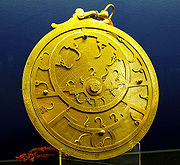
Whipple Museum of the History of Science
Encyclopedia

Scientific instrument
A scientific instrument can be any type of equipment, machine, apparatus or device as is specifically designed, constructed and often, through trial and error, ingeniously refined to apply utmost efficiency in the utilization of well proven physical principle, relationship or technology to...
s, apparatus, models, pictures, prints, photographs, books and other material related to the history of science
History of science
The history of science is the study of the historical development of human understandings of the natural world and the domains of the social sciences....
. It was founded in 1944, when Robert Whipple
Robert Stewart Whipple
Robert Stewart Whipple was an author and collector of science books and scientific instruments. He amassed a unique collection of antique scientific instruments that he later donated to found the Whipple Museum of the History of Science in 1944....
presented his collection of scientific instruments to the University of Cambridge
University of Cambridge
The University of Cambridge is a public research university located in Cambridge, United Kingdom. It is the second-oldest university in both the United Kingdom and the English-speaking world , and the seventh-oldest globally...
. The Museum's collection is 'designated'
Designation Scheme
The Designation Scheme is an English system that awards "designated status" to museums and library collections considered to be of great importance by the Museums, Libraries and Archives Council . As of 2009, 125 collections are officially recognized...
by the Museums, Libraries and Archives Council (MLA) as being of "national and international importance".
Department of History and Philosophy of Science
The Museum forms part of the Department of History and Philosophy of ScienceDepartment of History and Philosophy of Science, Cambridge
The Department of History and Philosophy of Science , of the University of Cambridge is the largest department of History and Philosophy of Science in the United Kingdom. It received a maximum rating of 4* for the majority of its submissions to the RAE 2008 Research Assessment Exercise...
, University of Cambridge
University of Cambridge
The University of Cambridge is a public research university located in Cambridge, United Kingdom. It is the second-oldest university in both the United Kingdom and the English-speaking world , and the seventh-oldest globally...
. The Department includes a working library with a large collection of early scientific books, some of which were given by Robert Whipple. The Museum plays an important part in the Department's teaching and research.
Collections
The museum's holdings are particularly strong in material dating from the 17th to the 19th centuries, especially objects produced by English instrument makers, although the collection contains objects dating from the medieval period to the present day. Instruments of astronomyAstronomy
Astronomy is a natural science that deals with the study of celestial objects and phenomena that originate outside the atmosphere of Earth...
, navigation
Navigation
Navigation is the process of monitoring and controlling the movement of a craft or vehicle from one place to another. It is also the term of art used for the specialized knowledge used by navigators to perform navigation tasks...
, surveying
Surveying
See Also: Public Land Survey SystemSurveying or land surveying is the technique, profession, and science of accurately determining the terrestrial or three-dimensional position of points and the distances and angles between them...
, drawing
Drawing
Drawing is a form of visual art that makes use of any number of drawing instruments to mark a two-dimensional medium. Common instruments include graphite pencils, pen and ink, inked brushes, wax color pencils, crayons, charcoal, chalk, pastels, markers, styluses, and various metals .An artist who...
and calculating are well represented, as are sundials, mathematical instruments and early electrical apparatus.
Since Robert Whipple's initial gift of the collection, the Museum has come to house many instruments formerly used in the Colleges and Departments of the University of Cambridge.
Opening hours
The museum is open to the public on weekday afternoons from 12.30pm to 4.30pm and admission is free.See also
- Jim BennettJim Bennett (historian)James Arthur Bennett PhD is a museum curator and historian of science.Jim Bennett is Director of the Museum of the History of Science at Oxford University. he was appointed on 1 October 1994, on the retirement of the previous director, Francis Maddison. He is also a member of the Faculty of...
, a previous curator, now at the Museum of the History of Science, OxfordMuseum of the History of Science, OxfordThe Museum of the History of Science, located in Broad Street, Oxford, is home to an unrivalled collection of scientific instruments from medieval times to the 17th century. Its collection of 18th and 19th-century instruments is also substantial...
. - History of scienceHistory of scienceThe history of science is the study of the historical development of human understandings of the natural world and the domains of the social sciences....

